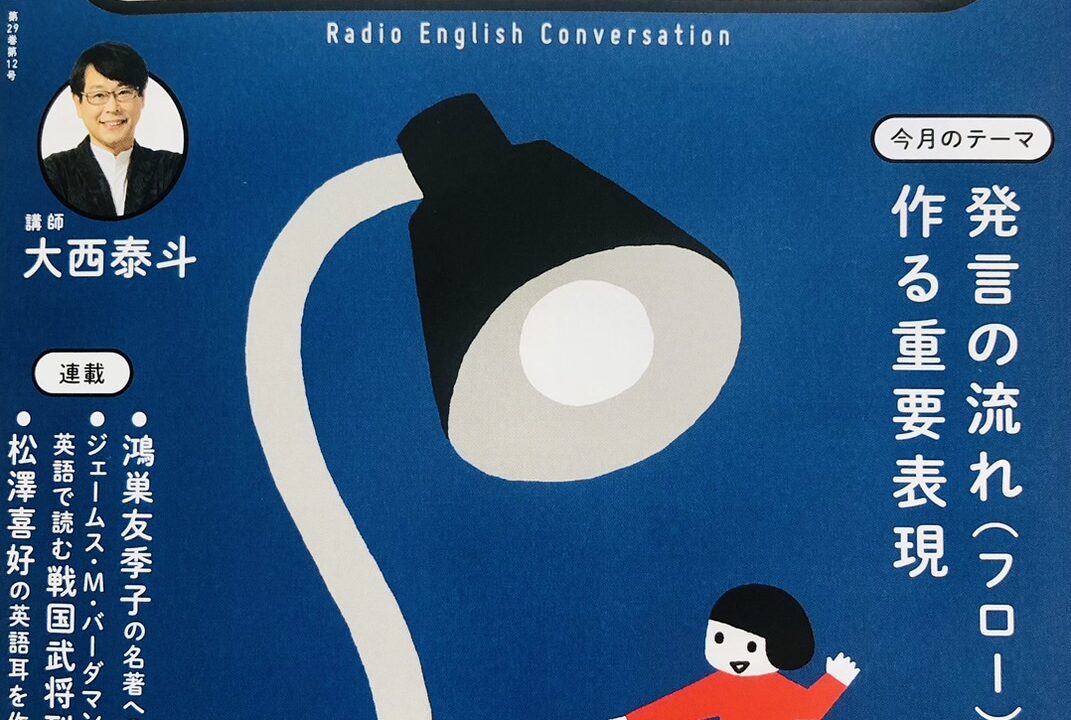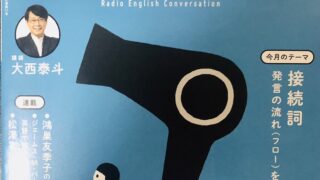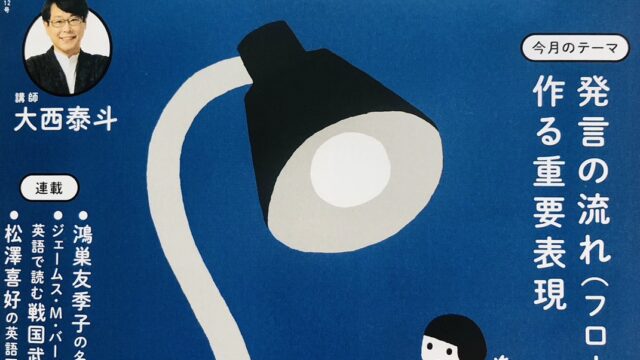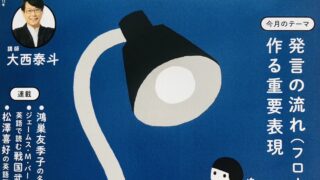【ラジオ英会話】Lesson 231 比較・対照フロー – March 13 Monday, 2023

March 13 Monday, 2023
Lesson 231 比較・対照フロー
☆Words & Phrases
**English translation:
It’s an English translation of haiku by Kobayashi Issa.
**Not really:
I’ve never heard of him. Is he like Basho? – Not really. His style of different.
How so?
**focus:
I think Basho’s haiku focus on beauty and nature.
**in contrast:
**everyday theme:
In contrast, Issa focuses on more everyday themes.
**grab:
There’s a famous haiku about a child wanting to grab the moon.
**be sure to ~:
Interesting. I’ll be sure to read that book.
☆Grammar & Vocabulary
① This is a new one I bought ( ) yesterday.
関係代名詞節による修飾
a new one と I bought yesterday の間で関係代名詞節による修飾が行われている。
関係代名詞節による修飾は「組み合わせ修飾」
I bought ( ) yesterday には bought の目的語位置に空所 ( ) があり、
「私が ( ) を昨日買った」
この空所が先行詞(修飾される名詞)a new one と組み合わされ、
「私が昨日買った – 新しいもの(本)」
となる。
練習の際は、英語語順に忠実に意識を動かすこと
この修飾は「説明ルール:説明は後ろに置く」の典型的な例。
まず、This is a new one と言い切り、a new one を I bought yesterday で説明している。
日本語訳は意味が反転するため参考にはならない!
② There’s a famous haiku about a child wanting to grab the moon.
動詞-ing形による名詞の修飾
名詞 a child の後ろに動詞-ing形が並んでいる。
「説明ルール:説明は後ろに置く」により、wanting to grab the moon は a child の説明となる。
「月を手で掴みたがっている子ども」ということ。
☆Key Sentence & Feel English
In contrast, Issa focuses on more everyday themes.
contrast は「対照・明らかな相違」
in contrast は「それと対照に・それと比べて」
in contrast to Basho のように対象を加える場合は、
in contrast to [with] ~(~と対照的に・~と比べて)を使う。
① Compared to last year, this year’s sales increased by 12%.
→ compare(比較する)の過去分詞を使った
compared to [with] ~(~と比べると)
比較の重要フレーズ。
in comparison with ~ (~と比べると)
もよく使われる。
② I’m a terrible golfer. On the other hand, my brother is a very good golfer.
I’m introverted, while my wife is quite extroverted.
→2者を対照的に述べのが、
on the other hand ~
本来、on the one hand ~ , on the other hand … という対句だが、単独でも使うことができる。二つの手の上にのせて「一方は、他方は」ということ。
2つの出来事が同時に展開することを表す接続詞 while も、2つを対照的に表すことができる。

③ We expected success. On the contrary, what we got was a failure.
Contrary to popular belief, ~
Contrary to all expectations, ~
→比較・対象の極端なケースは「逆・正反対」
contrary はそれを表す表現。on the contrary (それどころか)は、前言を強く否定し、真逆な内容を述べる。
contrary to ~(~に反して)も便利な表現。
☆Practice
C: OK guys. It’s practice time. Today let’s look at a few expressions that you can use when you wish to compare. OK. Let’s start!
……
(I’m a terrible golfer. On the other hand, my brother is a very good golfer.)
C: Sadly Roza, this is true about me too.
☆Expression in Action
①私たちの海外の売上は増加しています。それに対して、国内の売上は減少しています。
**overseas sales:
**domestic sales:
②一方で私の給料は上がりますが、他方では家族から遠く離れてしまいます。
**far away from ~:
③私がインド料理が好きじゃないって?それどころか、大のお気に入りですよ。
**absolute favorite:
☆Ending
O: Hey guys. Do you like “haiku”?
C: I like haiku.
R: Hmmm. I like haiku, but I prefer “tanka.” What about you, sensei?
O: I like it very much.
March 13 Monday, 2023
Lesson 231 比較・対照フロー
(日本語訳・解説付き)
☆Words & Phrases
**English translation: 英訳
It’s an English translation of haiku by Kobayashi Issa.
これは小林一茶の俳句を英訳したものです。
**Not really: (必ずしも)そういうわけではない
I’ve never heard of him. Is he like Basho? – Not really. His style of different.
私h彼のことは聞いたことがありません。芭蕉のような人ですか? – ちょっと違います。彼のスタイルは違います。
※ have never heard of ~. は現在完了経験用法「~は聞いたことがない」です。!
How so?
どういうところが?
※ この so は前の文の His style is different. の different を受けています。つまり「どのように違うのですか?」ということですね。
**focus: 注目する、重視する
I think Basho’s haiku focus on beauty and nature.
私は芭蕉の俳句は美しさや自然に注目していると思います。
**in contrast: それに対して
**everyday theme: 日常的なテーマ
In contrast, Issa focuses on more everyday themes.
それに対して、一茶はもっと日常的なテーマを重視しています。
**grab: (素早く)手に入れる、ひっつかむ
There’s a famous haiku about a child wanting to grab the moon.
月を手で掴みたがっている子どもについての有名な俳句があります。
**be sure to ~: きっと~する、必ず~する
Interesting. I’ll be sure to read that book.
面白いですね。私は必ずその本を読むでしょう。
※ be sure to ~ は「これから」を表す to不定詞が使われています!
☆Grammar & Vocabulary
① This is a new one I bought ( ) yesterday.
これは、私が昨日買った新しいものです。
関係代名詞節による修飾
a new one と I bought yesterday の間で関係代名詞節による修飾が行われている。
関係代名詞節による修飾は「組み合わせ修飾」
I bought ( ) yesterday には bought の目的語位置に空所 ( ) があり、
「私が ( ) を昨日買った」
この空所が先行詞(修飾される名詞)a new one と組み合わされ、
「私が昨日買った – 新しいもの(本)」
となる。
練習の際は、英語語順に忠実に意識を動かすこと
この修飾は「説明ルール:説明は後ろに置く」の典型的な例。
まず、This is a new one と言い切り、a new one を I bought yesterday で説明している。
日本語訳は意味が反転するため参考にはならない!
② There’s a famous haiku about a child wanting to grab the moon.
月を手で掴みたがっている子どもについての有名な俳句があります。
動詞-ing形による名詞の修飾
名詞 a child の後ろに動詞-ing形が並んでいる。
「説明ルール:説明は後ろに置く」により、wanting to grab the moon は a child の説明となる。
「月を手で掴みたがっている子ども」ということ。
☆Key Sentence & Feel English
In contrast, Issa focuses on more everyday themes.
それに対して、一茶はもっと日常的なテーマを重視しています。
contrast は「対照・明らかな相違」
in contrast は「それと対照に・それと比べて」
in contrast to Basho のように対象を加える場合は、
in contrast to [with] ~(~と対照的に・~と比べて)を使う。
① Compared to last year, this year’s sales increased by 12%.
去年と比べると、今年の売上は12%伸びました。
→ compare(比較する)の過去分詞を使った
compared to [with] ~(~と比べると)
比較の重要フレーズ。
in comparison with ~ (~と比べると)
もよく使われる。
② I’m a terrible golfer. On the other hand, my brother is a very good golfer.
私はゴルフがひどく下手です。一方、私の兄はとても上手です。
I’m introverted, while my wife is quite extroverted.
私は内向的ですが、妻はかなり外向的です。
→2者を対照的に述べのが、
on the other hand ~
本来、on the one hand ~ , on the other hand … という対句だが、単独でも使うことができる。二つの手の上にのせて「一方は、他方は」ということ。
2つの出来事が同時に展開することを表す接続詞 while も、2つを対照的に表すことができる。

③ We expected success. On the contrary, what we got was a failure.
私たちは成功を期待しました。それどころか、私たちが得たものは失敗でした。
Contrary to popular belief, ~
通説に反して~
Contrary to all expectations, ~
あらゆる予想に反して~
→比較・対象の極端なケースは「逆・正反対」
contrary はそれを表す表現。on the contrary (それどころか)は、前言を強く否定し、真逆な内容を述べる。
contrary to ~(~に反して)も便利な表現。
☆Practice
C: OK guys. It’s practice time. Today let’s look at a few expressions that you can use when you wish to compare. OK. Let’s start!
……
(I’m a terrible golfer. On the other hand, my brother is a very good golfer.)
C: Sadly Roza, this is true about me too.
☆Expression in Action
①私たちの海外の売上は増加しています。それに対して、国内の売上は減少しています。
Our overseas sales are increasing. In contrast, our domestic sales are declining.
**overseas sales: 海外の売上
**domestic sales: 国内の売上
②一方で私の給料は上がりますが、他方では家族から遠く離れてしまいます。
On the one hand, my salary will be bigger, but on the other hand, I’ll be far away from my family.
**far away from ~: ~から遠く離れる
③私がインド料理が好きじゃないって?それどころか、大のお気に入りですよ。
I don’t like Indian food? On the contrary, it’s my absolute favorite.
**absolute favorite: 大のお気に入り
☆Ending
O: Hey guys. Do you like “haiku”?
C: I like haiku.
R: Hmmm. I like haiku, but I prefer “tanka.” What about you, sensei?
O: I like it very much.
March 13 Monday, 2023
Lesson 231 比較・対照フロー
(日本語→英語バージョン)
☆Words & Phrases
**英訳:
これは小林一茶の俳句を英訳したものです。
→
**(必ずしも)そういうわけではない:
私h彼のことは聞いたことがありません。芭蕉のような人ですか? – ちょっと違います。彼のスタイルは違います。
→
※最初の文は、現在完了経験用法「~は聞いたことがない」です。!
どういうところが?
→
※ この so は前の文の different を受けています。つまり「どのように違うのですか?」ということですね。
**注目する、重視する:
私は芭蕉の俳句は美しさや自然に注目していると思います。
→
**それに対して:
**日常的なテーマ:
それに対して、一茶はもっと日常的なテーマを重視しています。
→
**(素早く)手に入れる、ひっつかむ:
月を手で掴みたがっている子どもについての有名な俳句があります。
→
**きっと~する、必ず~する:
面白いですね。私は必ずその本を読むでしょう。
→
※「これから」を表す to不定詞が使われています!
① 去年と比べると、今年の売上は12%伸びました。
→ compare(比較する)の過去分詞を使った
compared to [with] ~(~と比べると)
比較の重要フレーズ。
in comparison with ~ (~と比べると)
もよく使われる。
② 私はゴルフがひどく下手です。一方、私の兄はとても上手です。
私は内向的ですが、妻はかなり外向的です。
→2者を対照的に述べのが、
on the other hand ~
本来、on the one hand ~ , on the other hand … という対句だが、単独でも使うことができる。二つの手の上にのせて「一方は、他方は」ということ。
2つの出来事が同時に展開することを表す接続詞 while も、2つを対照的に表すことができる。

③ 私たちは成功を期待しました。それどころか、私たちが得たものは失敗でした。
通説に反して~
あらゆる予想に反して~
→比較・対象の極端なケースは「逆・正反対」
contrary はそれを表す表現。on the contrary (それどころか)は、前言を強く否定し、真逆な内容を述べる。
contrary to ~(~に反して)も便利な表現。


